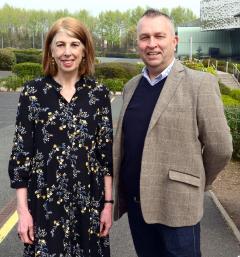Looking back at our editorial from this time last year we said that we were ‘… at a point in time that none of us could ever have imagined, when we are all dealing with extraordinary changes in our societies’. Since then, we have all been through the highs and lows of a pandemic year, but we have been heartened and inspired by articles on how our community is responding to these challenging times.
Back in December we published an article by Alicia Wise and Frances Pinter who said that in response to the pandemic universities and publishers will need to be creative, embrace change and take some calculated risks. We are inspired by the creativity of the Irish Library sector. The team at Maynooth University Library explain how Irish Libraries responded to the global pandemic. This article amazed us, not only by the speed with which the library sector responded, but also by its ingenuity. Not least the part it played in efforts to print 50,000 face shields and raising in excess of €54,000 to sustain the effort to produce personal protective equipment (PPE) for healthcare workers.
While we hope that some things will pass with the pandemic, there are some changes we will want to preserve as our ‘new normal’. In her article Katherine Stephan considers some of these changes and argues that libraries should embrace principles of ‘planned happenstance’ so as to expand what may be possible with new working spaces and new realities.
Covid has meant that libraries have had to rapidly overhaul their services and accelerate the shift to digital in a short space of time. Anna Franca’s article discusses the significant challenges of how to provide students with continued access to books previously only available in print. She shares some of the barriers her library has faced in sourcing e-textbooks, which are so important in improving student satisfaction and success through these tough times and beyond. She concludes that even so, it is clear that the current cost of e-textbooks is not sustainable and unless publishers are willing to adopt fairer and more affordable access models the student experience will, inevitably, suffer.
In October we published an article by Patrick H. Alexander which questioned Harvard’s open access policy, and so this year we are pleased to publish an article by Ke Wu, Jiafeng Shou and Neil Smyth which provides a perspective from China. They explain how, since the introduction of a University Publications Licence in 2019, their institution has retained rights for 74% of research publications submitted to publishers, enabling the library to make the outputs accessible via the green route to open access.
One of the concerns about the gold route to open access is the impact on researchers in the least developed countries in the world. Niels Taubert and his colleagues wondered if it is economically feasible for a large publishing house to waive article processing charges for those countries. To test this, they took Springer Nature as a test case, and their modelling indicates that it is possible in economic terms for such publishers to waive APCs for these countries without much loss in revenues.
Libraries and publishers sometimes struggle to understand each other’s needs and processes, so the article by Sarah Roughley Barake and Alison Welsby from Liverpool University Press and the University of Liverpool Library provides some unique insights. They collaborated to publish two open access monographs. Both found the project extremely beneficial and concluded that transparency from publishers about costs, as well as a greater understanding of the financial requirements of libraries, will allow publishers to plan their marketing of open monographs more effectively. Usage data for open access books are important to many stakeholders. However, there is no universally accepted standard that is used by all providers of OA book collections. We will shortly publish an article by Ronald Snijder, from the OAPEN foundation, which contrasts usage statistics by using Google Analytics (GA) and Release 5 (R5) of the COUNTER Code of Practice in monitoring all events happening on the platform. Another upcoming article by Lisa Schilhan, Christian Kaier and Karin Lackner explains how search engine optimization (SEO) can make relevant literature easier to find and the research process more efficient. We had never come across the term ghost authors before, but Jaime A. Teixeira da Silva and Aceil Al-Khatib’s article will explain, in the context of why copyright transfer is a central issue in the flow of scientific information.
We are so looking forward to meeting our authors and readers at the virtual UKSG conference in April. Meanwhile, keep sharing, keep finding comfort and support in our rich and diverse community and keep reading Insights!
Lorraine Estelle and Steve Sharp

